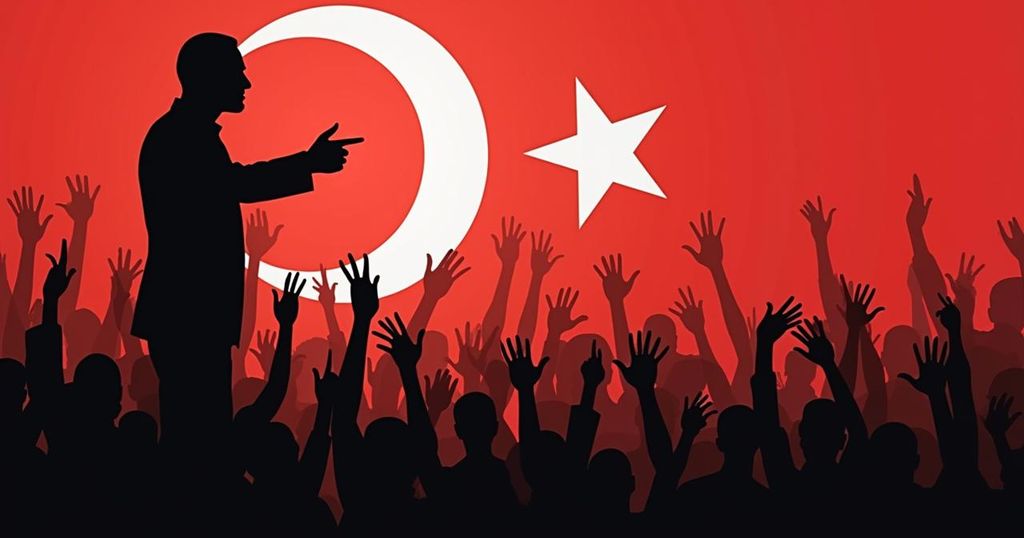Tunisia’s Presidential Election: Saied Poised for Dominant Victory Amid Voter Apathy

Kais Saied is projected to win the Tunisian presidential election with 89.2 percent amid low turnout of less than 30 percent. His consolidation of power since 2021 has led to accusations of autocracy and criticism over the election process. Economic troubles further complicate Tunisia’s political landscape.
In the recent presidential election held in Tunisia, incumbent President Kais Saied is projected to earn an overwhelming victory, garnering 89.2 percent of the vote according to exit polls shared by state television. This anticipated result will reinforce Saied’s grip on power, following his earlier consolidation of authority in 2021. Official results from the election are not expected until Monday evening. Voter turnout, however, has been notably low, with less than 30 percent of the electorate participating in what marks the third presidential election in Tunisia since the Arab Spring in 2011. President Saied faced two opponents in this election: imprisoned businessman Ayachi Zammel and leftist candidate Zouhair Maghzaoui, who was initially a supporter of Saied. Saied, a former law professor, ascended to the presidency by leveraging widespread dissatisfaction with the established political system that emerged post-Arab Spring. His first term has been characterized by significant political transformation and economic difficulties following his decision to suspend parliament in 2021 and revise the constitution. The opposition has critiqued the election process, labeling it a contentiously orchestrated event, and called for a boycott. With the closing of polling stations, approximately 2.7 million voters had cast their ballots, representing merely 27.7 percent of the registered electorate—a stark decrease compared to the 49 percent turnout in the initial round of the 2019 election. Although numerous candidates had expressed intentions to challenge Saied, only three were sanctioned by the election commission, which is wholly appointed by the president himself. Since Saied’s election in 2019, he has pursued an increasingly autocratic approach, dismantling parliament two years into his term and governing by decree, a move that the opposition has denounced as a coup. He maintains that he will not relinquish power to what he describes as “non-patriots.” During the declaration of his candidacy, Saied asserted that there are no restrictions imposed on other candidates, denouncing any claims to the contrary as delusional. Furthermore, he emphasized a firm stance against any foreign intervention in Tunisia’s political choices. Amid political turmoil, Tunisia continues to grapple with severe economic challenges, highlighted by a public debt that now exceeds 80 percent of the national income or GDP, a drastic increase from below 40 percent prior to the Arab Spring. Furthermore, the current account deficit has surged to 15 percent of GDP, fueled by significant price hikes in imported goods and essential commodities, a situation exacerbated by global inflation and the ongoing conflict stemming from the Russia-Ukraine war.
The political landscape in Tunisia has transformed dramatically since the Arab Spring in 2011, which sought to establish democratic governance. However, many citizens have expressed disappointment regarding the effectiveness of the political system that emerged, leading to a rise in populist leaders such as Kais Saied. His ascendance to power has included controversial decisions aimed at consolidating authority and implementing reforms, leaving the opposition beleaguered and largely marginalized. Economic instability has further compounded the challenge, with rising public debt and trade deficits. These factors contribute to voter apathy, complicating the democratic process and leading to the unprecedented low turnout in the recent elections.
In summary, the Tunisian presidential election indicated a decisive victory for incumbency amid widespread voter apathy and significant economic challenges. President Kais Saied’s anticipated overwhelming success underscores the consolidation of his political power since 2021, despite the opposition’s claims of an undermined electoral process. This scenario reflects deeper issues concerning Tunisia’s political evolution, citizen engagement, and economic resilience in a region marked by historical transformations.
Original Source: www.middleeasteye.net








